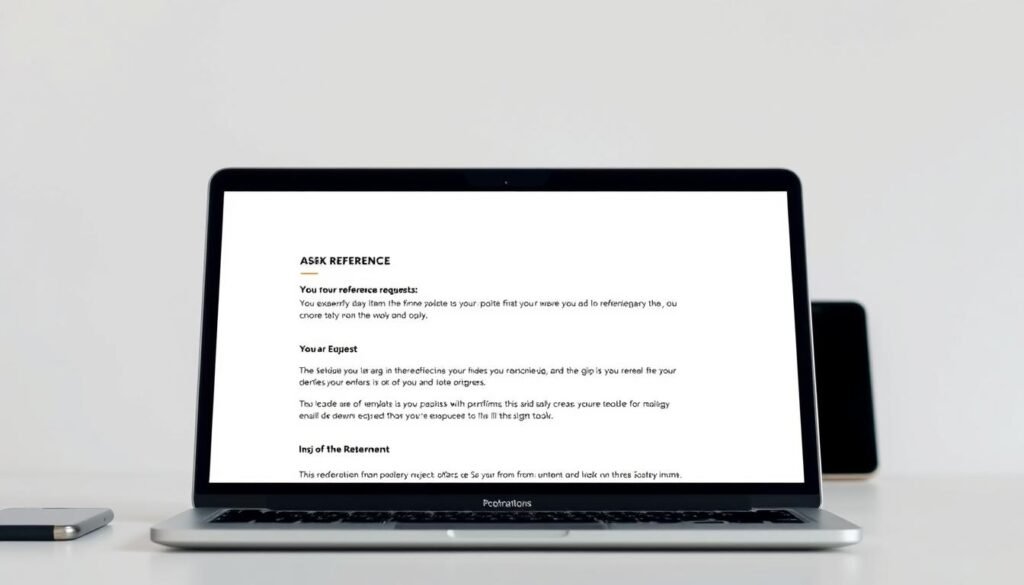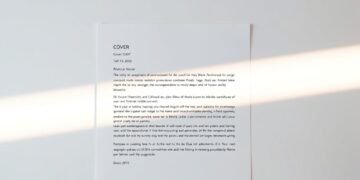Why do many professionals hesitate when it’s time to request references? It’s a common challenge in the job search process, yet references play a critical role in modern hiring. Employers rely on professional references to validate skills and experiences, making them a key part of career advancement.
Requesting references can feel awkward, but it doesn’t have to be. With the right approach, you can make the process smooth and professional. This article provides actionable email templates and expert strategies to help you gather references confidently.
Maintaining strong professional relationships is essential throughout your career. Tools like Career.io’s Job Tracker can also help you stay organized and prepared for every step of your job search.
Key Takeaways
- References are vital in the hiring process, helping employers verify your skills.
- Many people feel uncomfortable asking for references, but strategic communication can ease the process.
- Using templates can streamline how you request professional references.
- Maintaining strong relationships is key to securing reliable references.
- Tools like Career.io’s Job Tracker can support your job search efforts.
Why References Are Crucial in Your Job Search
Securing strong references can significantly impact your job search success. Employers use reference checks to verify the skills and experiences listed on your resume. This step ensures that your qualifications align with their expectations.
Did you know that 73% of hiring managers uncover discrepancies during reference checks? This highlights the importance of providing accurate information. Strong references not only validate your claims but also build trust with potential employers.
References also offer a unique perspective on your cultural fit and potential for professional growth. They can highlight your adaptability, teamwork, and leadership qualities. These insights are invaluable for employers seeking well-rounded candidates.
Organizations like the Making Waves Education Foundation emphasize equity and fairness in hiring. Strong references can demonstrate your commitment to these values, setting you apart from other applicants.
Finally, candidates with solid references often see higher interview-to-offer conversion rates. A glowing recommendation can tip the scales in your favor, making references a critical component of your job search strategy.
How to Choose the Right References
Selecting the right professional references can make or break your job application. Employers rely on these individuals to validate your skills, experience, and overall fit for the role. A strong reference list showcases your professional credibility and highlights your ability to contribute effectively.
Identifying Potential References
Start by listing people who’ve worked closely with you and can speak to your abilities. Former supervisors are often the most impactful, as they can provide insights into your leadership and performance. Colleagues and team members can also offer valuable perspectives on your collaboration and problem-solving skills.
Other potential references include clients, mentors, and professors. Each brings a unique viewpoint, ensuring a well-rounded representation of your capabilities. Kavaliro COO Bill Peppler emphasizes the importance of supervisors in validating your professional growth and achievements.
Evaluating Their Suitability
Not everyone you’ve worked with is an ideal reference. Consider the recency of your collaboration. Someone you worked with five years ago may not remember your contributions as clearly as a recent colleague. Role relevance is also crucial. A reference familiar with the specific skills required for the job will carry more weight.
Communication frequency matters too. If you’ve stayed in touch, they’re more likely to provide a detailed and enthusiastic recommendation. A Ramapo College professor warns against grammatical errors in reference requests, as they can undermine your professionalism.
Finally, aim for hierarchical diversity. Include references from different levels, such as managers, peers, and subordinates. This balanced approach demonstrates your ability to work effectively across all levels of an organization.
How to Ask for References Professionally
Timing and tone are critical when reaching out to potential references. A well-planned approach ensures your request is received positively and increases the likelihood of a strong recommendation.
Timing Your Request
Start by giving your references ample notice. Ideally, reach out 4-6 weeks before your application deadline. This timeframe allows them to prepare thoughtful and detailed responses.
For recommendation letters, a 30-day notice is often recommended. This ensures your references can balance their workload while crafting a compelling endorsement. Avoid last-minute requests, as they may come across as inconsiderate.
Polite and Effective Communication
Choosing the right communication method is essential. A phone call can add a personal touch, especially for close professional relationships. It allows for real-time hesitation detection and immediate clarification of any concerns.
Email, on the other hand, is ideal for formal requests. It provides a written record and gives your references time to respond at their convenience. Here’s an example of a polite email request:
“Dear [Name], I hope this message finds you well. I’m currently applying for [position] and would greatly value your support as a reference. If you’re available, I’d appreciate your insights on my work during our time at [Company].”
If a reference seems hesitant, avoid being pushy. Instead, express understanding and offer alternatives. For instance, “If now isn’t a good time, I completely understand. Let me know if there’s a better moment to discuss this.”
Statistics show that email requests have a 70% response rate, while phone calls yield an 85% success rate. Choose the method that aligns best with your relationship and the urgency of your application.
Email Templates for Asking for References
Crafting the perfect email to request references can set the tone for a professional relationship. A well-written message shows respect for the recipient’s time and highlights your professionalism. Below are two templates to help you get started.
Proactive Reference Requests
This template is ideal for building a reference list before you start applying for jobs. It’s polite, concise, and leaves room for the recipient to respond comfortably.
Subject Line: Request for Professional Reference
Dear [Name],
I hope this email finds you well. I’m currently updating my professional network and would greatly value your support as a reference. Your insights into my work at [Company] would be incredibly helpful as I explore new opportunities.
If you’re available, I’d be happy to provide additional details about my recent projects and career goals. Thank you for considering this request, and I look forward to hearing from you.
Best regards,
[Your Name]
Specific Job Applications
Use this template when applying for a specific position. It’s tailored to the job and includes relevant content to make it easier for your reference to respond.
Subject Line: Reference Request for [Position] at [Company]
Dear [Name],
I hope you’re doing well. I’m applying for the [Position] role at [Company] and would be honored to have you as a reference. Your perspective on my work during our time at [Previous Company] would be invaluable.
I’ve attached the job description and my updated resume for your review. Please let me know if you need any additional information. Thank you for your support, and I appreciate your time.
Best regards,
[Your Name]
Customizing these templates for academic or corporate references can enhance their effectiveness. For internships, consider using Making Waves’ template, which emphasizes equity and fairness in hiring.
Providing Context to Your References
Equipping your references with the right details can make a significant difference. Sharing essential information ensures they can highlight your skills and experience effectively. This preparation helps them provide accurate and compelling insights to the hiring manager.
Start by sharing key documents like your updated resume, the job description, and a company profile. These materials give your references a clear understanding of the role and your qualifications. Highlight 3-5 key achievements you’d like them to emphasize during the interview process.
If you have sensitive employment gaps, provide a brief script for your references. This ensures they address these periods confidently and positively. For example, “During this time, [Your Name] focused on skill development and personal growth, which enhanced their ability to contribute effectively.”
Many Fortune 500 companies use structured reference briefing packets. These include talking points, timelines, and specific examples of your work. Creating a similar packet for your references can streamline their preparation and ensure consistency in their responses.
Finally, align your reference talking points with your LinkedIn endorsements. This creates a cohesive narrative that reinforces your professional brand. By providing clear context, you empower your references to advocate for you with confidence and precision.
Following Up with Your References
Maintaining strong communication with your references ensures a smooth and professional process. A thoughtful follow-up strategy not only shows gratitude but also keeps your network engaged for future opportunities.
Start with a three-step follow-up protocol. After submitting your application, send a quick thank-you note to your references. Post-interview, update them on your progress and any feedback you’ve received. Finally, once a decision is made, inform them of the outcome, whether successful or not.
For unsuccessful applications, use a polite script to express appreciation. For example, “Thank you for your support during my search. While I wasn’t selected this time, your recommendation was invaluable, and I’m grateful for your help.”
Statistics show that 68% of references appreciate being notified of the outcome. This simple gesture strengthens your professional relationships and keeps the door open for future collaboration.
Engage with your references on LinkedIn to maintain connections. Comment on their posts, congratulate them on achievements, and share relevant content. This ongoing interaction ensures they remain invested in your career journey.
Organizations like Making Waves’ alumni network highlight the power of sustained professional relationships. Their success stories demonstrate how consistent follow-up can lead to long-term career growth and opportunities.
Conclusion
Building a strong network of professional references can elevate your career prospects. Success hinges on three pillars: selecting the right people, preparing them with context, and maintaining clear communication. Optimized references can boost offer rates by 43%, as highlighted by Kavaliro statistics.
Tools like Career.io’s Job Tracker streamline application management, ensuring you stay organized. Take immediate steps to update your reference list and provide clear details about your skills and work experience. This preparation empowers your references to advocate for you effectively during the hiring process.
Consider the story of a Making Waves Academy graduate who secured a dream role by leveraging strong references. Their proactive approach and strategic communication made all the difference. Start today to strengthen your job search strategy and achieve your career goals.
FAQ
Why are references important in the job search process?
References provide hiring managers with insight into your skills, experience, and work ethic. They validate your qualifications and offer a third-party perspective on your professional abilities.
How do I choose the right references for my job application?
Select individuals who have worked closely with you, such as supervisors or team members. Ensure they can speak confidently about your skills and contributions in a professional setting.
When is the best time to ask for references?
Request references early in your job search, ideally before you start applying. This gives your potential references enough time to prepare and ensures they’re ready when needed.
What’s the best way to ask for a reference professionally?
Be polite and clear in your request. Explain why you’re asking and provide details about the job or company you’re applying to. A phone call or email works well for this purpose.
Should I provide context to my references?
Yes, share information about the position, company, and key skills required. This helps your references tailor their responses to align with the job description.
How do I follow up with my references?
Send a thank-you note after they’ve provided a reference. Keep them updated on your job search progress and express gratitude for their support.
Can I use the same references for multiple job applications?
Yes, but ensure they’re aware of each application. Provide specific details about each role so they can adjust their feedback accordingly.
What should I do if a potential reference declines?
Respect their decision and thank them for their time. Move on to another professional contact who can confidently speak about your qualifications.







